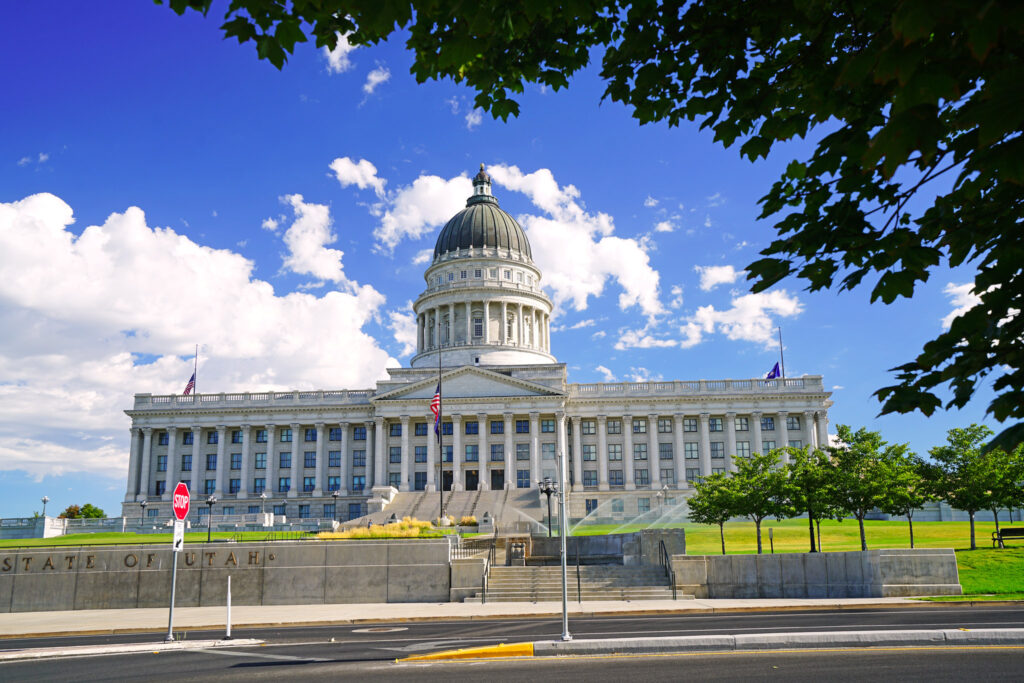Utah Republicans Put Anti-Democratic Constitutional Amendment on November Ballot

The Republican majority in the Utah Legislature voted to put a constitutional amendment on the ballot in November that would give them power to veto or alter voter-approved ballot measures.
Wednesday’s vote came after the Legislature called itself into a special session to discuss the constitutional amendment. Passing a constitutional amendment requires a two-thirds majority vote in both chambers of the Legislature, in order to place it on the next ballot for voters to weigh in. Only if a majority of voters approve the amendment will it take effect.
According to the Utah News Dispatch, the constitutional amendment passed 20-8 in the Senate and 54-21 in the House. All Democrats voted against the amendment, with a handful of Republican senators and representatives crossing party lines to vote against it.
The rapid push to pass the amendment, which would allow lawmakers to “retain the ability to amend or repeal legislation” approved through voter referendums, comes on the heels of a consequential Utah Supreme Court ruling in July in a lawsuit related to a previous ballot initiative approved by voters to establish an independent redistricting commission.
Instead of using the maps drawn by the commission, Republican lawmakers drew and passed their own maps, in violation of the state’s constitution, according to the lawsuit.
Now voters will determine if lawmakers should have veto power over future ballot initiatives, come November.
Original post, August 20, 2024:
Republican lawmakers in Utah are scrambling to push through a constitutional amendment to go on the November ballot that, should it pass, will give them veto power over voter-approved ballot measures.
The Utah Legislature will call itself into a special session on Wednesday to vote on placing a constitutional amendment on the ballot that, in essence, would allow lawmakers to “retain the ability to amend or repeal legislation” approved through voter referendums. The amendment also bans foreign money contributions to ballot initiatives and increases the timeline for gathering signatures on referendums.
The special session was rushed onto the Legislature’s schedule in response to a recent Utah Supreme Court opinion on a lawsuit filed by pro-voting groups challenging the state’s new congressional map drawn with 2020 census data. In 2022, the League of Women Voters of Utah, Mormon Women for Ethical Government and a group of voters sued the state Legislature alleging that the state’s new congressional map is a partisan gerrymander.
The lawsuit also challenged the Legislature’s repeal of Proposition 4 — a ballot initiative passed in 2018 that created an independent redistricting commission composed of citizens. In the process of choosing a new map to implement, state lawmakers shunned the one drawn by the independent commission in favor of a gerrymandered map created by the Legislative Redistricting Committee, which consisted of 15 Republicans and only five Democrats.
The lawsuit argued that this move “violated the people’s constitutionally guaranteed lawmaking power and right to alter and reform their government.” But a trial court dismissed the Proposition 4 claims, while allowing the partisan gerrymander claim to move forward. The plaintiffs appealed the trial court’s dismissal to the Utah Supreme Court and, last month, the state’s highest court reversed the dismissal of the plaintiff’s Proposition 4 claims, sending the lawsuit back to trial court for further litigation.
The Utah Democratic Party (UDP) called the ruling “a victory for Utah voters against hyper-partisan gerrymandering and will protect future ballot initiatives from legislative overreach” but noted that the lower court still has to decide if the state must redraw legislative congressional districts. Litigation is ongoing in trial court for the Proposition 4 claims, while the Utah Supreme Court deferred its ruling on the plaintiff’s partisan gerrymandering claims.
Last week, UDP filed a motion to intervene in the lawsuit. On the same day, a coalition of state Republicans sent a letter to Utah Governor Spencer Cox (R), Senate President Stuart Adams (R) and House Speaker Mike Schultz (R) urging them to call a special session to vote on the constitutional amendment. “This ruling represents an existential threat to the values, culture, and way of life that define our state,” the letter said. “While past legislative overreach has understandably led to some distrust among the people, the voice of the people in governance remains crucial and cannot be overstated.”
By passing a constitutional amendment, which requires two-thirds approval of both chambers of the state Legislature and then must be approved by voters, it would mean any future ballot initiatives in the state — like Proposition 4 — could be vetoed by lawmakers, effectively negating the will of the voters.
“The Republican Supermajority is going to extreme lengths to seize power for themselves because they know that Utah is changing,” UDP said in a statement. “Now, the Supermajority is trying to trick Utahns into changing our state constitution so Republicans can hold onto power.”